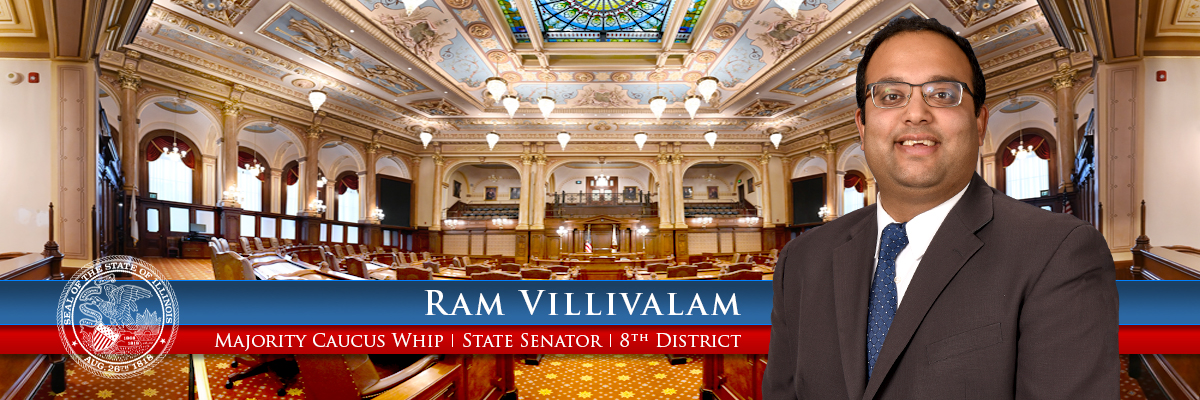I want to provide an update on COVID-19 (novel coronavirus) in Illinois and inform you of some of the steps our state government is taking in response to COVID-19 to slow the spread of the virus and keep our residents safe and informed:
- The Governor declared a Disaster Proclamation (Illinois' version of a Declaration of a State of Emergency) to ensure our government has access to every tool necessary to manage the spread of COVID-19.
- The Governor, in consultation with public health professionals and State Superintendent Carmen Ayala, has decided to close all schools in Illinois, public and private, from Tuesday 3/17 through Monday 3/30.
- The Governor and health professionals including Dr. Ngozi Ezike, Director of the Illinois Department of Public Health, have called on every individual in our state to do their part to limit the virus' spread and protect our most vulnerable residents by practicing social distancing, staying home when they are sick, washing hands for 20 seconds, avoiding large crowds, and generally not treating their whereabouts as business as usual.
- The State of Illinois, Cook County, and the City of Chicago have all issued bans on gatherings of more than 1,000 people, and Governor Pritzker and our state's executives are asking those who administer gatherings of greater than 250 people to cancel or indefinitely postpone such public gatherings.
- The Pritzker administration is filing emergency rules in coordination with the Illinois Department of Employment Security to clarify that individuals unemployed due to COVID-19 can generally qualify for unemployment benefits to the full extent permitted by federal law.
- The Governor's office is holding press conferences every day to keep the public informed. Up to date information and video of these press conferences can be found on the Illinois Department of Public Health's website.
For more information on the impact of COVID-19 in our local community, you can watch a video of the Facebook Live I hosted with Senator Martwick and health experts from the local and state levelHERE.
There is a lot of misinformation circulating about COVID-19. I ask that you consult trusted sources for updates, including the Center for Disease Control, the Illinois Department of Public HealthCOVID-19 hotline: 1-800-889-3931 or
Please do not hestitate to call us at 872-208-5188, send a message at www.senatorram.com/contact-us, or email
Above all, I urge you not to panic. The State of Illinois is prepared to handle the developing situation, and I'm confident our officials will do their best to keep our residents safe.
Frequently Asked Questions about Coronavirus
What is coronavirus?
According to the Centers for Disease Control (CDC), coronaviruses commonly cause mild to moderate illness in people worldwide. Most of the time, they aren't much different from a cold or flu virus— coronavirus symptoms may include fever, cough and shortness of breath, and usually only last for a short amount of time. There are no specific treatments for coronavirus, but to relieve symptoms, patients are instructed to take pain and fever medications, drink plenty of liquids, and stay home and rest.
What’s the status of coronavirus in Illinois?
Currently, the number of coronavirus cases in the state remains low, but it continues to climb. The Illinois Department of Public Health (IDPH) has posted coronavirus case totals and test results on its website, updated daily.
Is Illinois prepared to handle a potential outbreak?
Illinois health officials have acted swiftly to contain the virus, and they are prepared for the future. Illinois was the first state to provide coronavirus testing, and hospitals and health providers across the region are already expanding their surveillance efforts by offering patients with flu-like symptoms the option to be tested for the virus. IDPH has outfitted two additional labs in central and southern Illinois to handle the extra testing load.
On March 9, Gov. Pritzker issued a statewide Disaster Proclamation, which will allow Illinois to receive federal resources and support to advance preparation and planning. This declaration will build on the state's strong response to the outbreak.
How do I know if my family and I are at risk?
Public health officials will reach out to individuals who may have been exposed. They are actively monitoring the situation and will update the public in the event that certain measures— like school and business closures— are necessary.
How does coronavirus spread?
According to the CDC, coronavirus mainly spreads from person to person. Act the same way you would act if you had the flu— if you think you may be sick, keep your distance from other people and always cover your coughs and sneezes.
How can I stay healthy?
The IDPH and the CDC have issued recommendations to help people avoid coming down with coronavirus. Keep in mind: These tips are helpful for avoiding any virus, including the flu and the common cold!
- Wash your hands often with soap and water for at least 20 seconds.
- Avoid touching your eyes, nose, and mouth with unwashed hands.
- Avoid close contact with people who are sick.
- Stay home when you are sick.
- Cover your cough or sneeze with a tissue, then throw the tissue in the trash.
- Clean and disinfect frequently touched objects and surfaces.
If I get sick, will insurance cover my care?
If you have questions regarding health insurance and HMO inquiries, please call the Illinois Department of Insurance at (877) 527-9431. If you have questions regarding Medicare beneficiaries and caregiver inquiries, please call CMS at (800) 548-9034.
With questions and concerns about coronavirus,
please call the IDPH 24/7 hotline at 1-800-889-3931
or email





